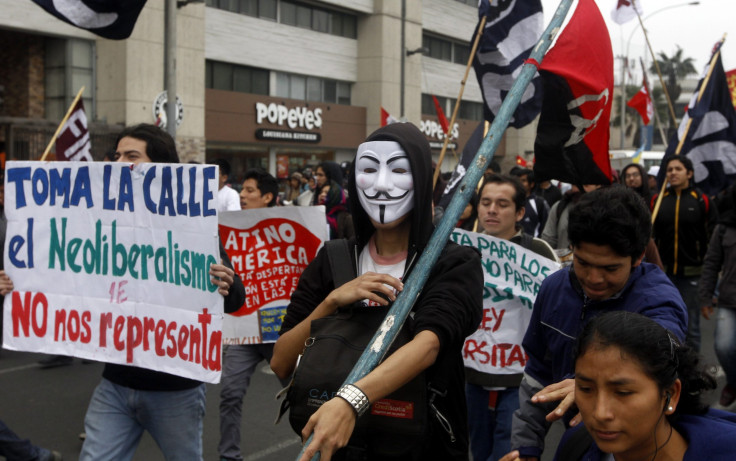Peru Protests Go Viral As President Ollanta Humala Celebrates 2 Years In Office

Peruvian President Ollanta Humala rang in two years as leader of the country with a polarized audience. On one hand, analysts and economists praise his performance, as he has managed to stabilize the economy and make Peru into a mining power. On the other, people have taken to the streets, something never before seen in Peru, to demand the end of corruption in the government and better health care, education and security.
Humala was elected in 2011 against Keiko Fujimori, daughter of former President Alberto Fujimori, who has been charged with crimes against humanity. It was Humala’s second try for the presidency; his moderately nationalist message won over large sectors of society, including Nobel Prize winner Mario Vargas Llosa, a hugely popular writer and politician who was himself defeated by Fujimori in the 1990 election.
According to a survey by consulting firm GFK Group, more than half of Peruvians, 57 percent, think that Humala does not have a clear plan for the country. The president’s approval rating is now 33 percent, dropping 20 percentage points since March.
The middle class took the streets for the first time on July 17, in a surprising move that was compared to the demonstrations in Brazil last June. More than 3,000 people gathered peacefully in front of Congress in Lima, and were chased away by police with tear gas. Two days later, a smaller protest broke out, and a third, the biggest one to date, happened on July 27, the eve of Peru's Independence Day.
Local newspapers wrote of violent confrontations between protesters and police; 8,000 demonstrators faced off against 5,500 police, who sprayed them with tear gas and pepper spray. More than 30 people were arrested, said Peruvian newspaper La República.
Eduardo Dargent, a Peruvian professor at Austin University, told Spanish newspaper El País that he did not think Humala was at war with the streets. “It was only 8,000 people -- his problems are elsewhere, not in the streets,” he said, meaning the low approval rates and the perception Peruvian society has of his administration: 54 percent give his second year in office a C- grade, according to GFK. On top of that, almost half believe that the third year will be no better.
Humala spoke to the nation on Independence Day, saying the government has the duty of defending the people’s interests. “My government is open to dialogue, and I personally think it is important for people to feel comfortable enough to go claim publicly what’s theirs,” he told Peruvian newspaper El Comercio.
© Copyright IBTimes 2024. All rights reserved.




















